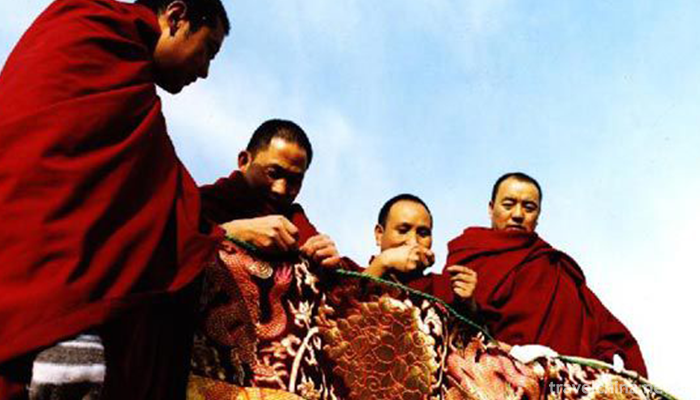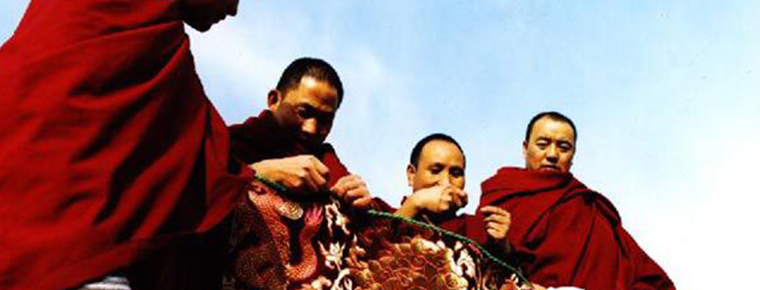Huangzhong embroidery
Huangzhong embroidery
Huangzhong heap embroidery is a kind of art that uses the techniques of "shearing" and "heap" to create images. It is mostly used in Tangka production, with Tibetan Buddhist themes as its main content. The piling embroidery in Huangzhong County has a history of more than 600 years. The piling embroidery in the Tar Temple in Huangzhong County is a treasure of Tibetan Buddhist art. It is known as one of the three greatest Arts in the Tar Temple and is well known.
On June 7, 2008, Huangzhong Pile Embroidery was approved by the State Council to be included in the second batch of national intangible cultural heritage list.
Brief introduction of embroidery
Huangzhong heap embroidery has a history of more than 600 years. It is created and inherited by the Han and Tibetan people in Huangzhong County. It combines national culture and folk art into a furnace and has great value. It combines relief and embroidery skillfully, and has high value of Arts and crafts and aesthetic value.
This is the county's tall temple butter flowers, Canadian Tibetan carpet weaving skills, Huangzhong peasant paintings, 1000-family camp platforms, but West Dewa village after the ancient game, the county's cultural skills were once again included in the provincial cultural heritage list. So far, the county has been included in the provincial intangible cultural heritage list of seven projects, including Tar Temple butter flowers and Jiaya Tibetan carpet weaving skills were also included in the national intangible cultural heritage list.
Origin of embroidery
Tangka heap embroidery has strong nationality and religion. Will it make the market of heap embroidery broader if it is used as the craftsmanship of Tangka heap embroidery to make crafts with rich life flavor? Therefore, she tried to use the composition and color matching techniques of traditional Chinese painting to enrich the themes of heap embroidery. A series of heap embroidery crafts developed soon attracted a large number of customers.
Traditional Tangka heap embroidery is different, heap embroidery handicraft is cut into various patterns and shapes by various colors of cotton, silk and satin, carefully stacked and pasted into a complete picture. The process includes pattern design, cutting, stacking and coloring of individual patterns. Generally speaking, the main part of pattern design is customer demand. Sketching is the most important step to consider the artist's painting skills. After the pattern design is completed, all kinds of cloth are cut and glued better than the pattern, and then filled with wool or cotton to make the pattern protrude. Finally, all kinds of cloth patterns are stacked on the designed large-scale cloth mantle to form a complete set of pictures, so as to achieve a static, vivid and lifelike situation. Make the picture rich and vivid three-dimensional sense and fabric unique texture sense, achieve the artistic effect of shallow relief, rich expression. The works are exquisite in roughness, wonderful in every drop, exquisite in skill and ingenuity. A pile of embroidery can be said to be a silk color relief work, which has great artistic and ornamental value.
Inheritance of embroidery
Since 2008, under the arrangement of Sunshine Office and Poverty Alleviation Office in Huangzhong County, the Tibetan Culture and Art Vocational School in Huangzhong County has successively held piling embroidery training classes for rural women in Zhenyi and Geercun villages in the western part of Huangzhong County, Gonghe Town, Xizhuang Village and Nancun villages, etc. The vocational and technical school in Huangzhong County of Qinghai Province has offered arts and crafts classes, inviting art monks from Buddhist monasteries to come to school classes for local farmers. The children taught Tangka and embroidery production techniques, which were welcomed by local farmers. Farmer women's embroidery works were purchased by Shengyu Cultural Communication Co., Ltd., a subsidiary of Huangzhong Tibetan Culture and Art Vocational School. More than 200 rural women in the county have been trained in embroidery technology.


-
2.Jinshuitai Hot Spring Scenic Area
Jinshuitai Hot Spring is a hot spring resort built according to the national AAAA scenic standard. It is located in Shuitai Town, Xinxing County, Guangdong Province
Time 2019-01-27 -
3.The Old Site of Command of 115 Division of Shandong Province Government and Eighth Route Army
The former site of Shandong provincial government and 115 division headquarters of the Eighth Route Army is the headquarters of 115 division of the Eighth Route Army, Shandong Branch of the Communist
Time 2019-02-08 -
4.Zigong Dinosaur Museum
Zigong Dinosaur Museum is located in the northeast of Zigong City, Sichuan Province, 11 kilometers from the city center. It is a large site museum built on the world famous "Dashanpu Dinosaur Fos
Time 2019-03-22 -
5.Donghe Opera
Donghe Opera, one of the national intangible cultural heritage, is a traditional drama in Donghe area of Ganzhou City, Jiangxi Province.
Time 2019-04-27 -
6.Shangdang Erhuang
Pihuangqiang in Shangdang area is called Shangdang Erhuang. It is an independent opera with a history of more than 200 years. Locals call it "Tu Erhuang". At present, Shangdang Erhuang is on
Time 2019-06-13 -
7.Tongcheng Song
Tongcheng Song is a kind of local folk song originating from Tongcheng, Anhui Province. It is a kind of local folk literature in the form of rhyme created by the local working people collectively. At
Time 2019-06-21 -
8.Fishing Song
Fishing songs are a kind of Chinese folk songs sung by fishermen in coastal areas of China and lakes and harbours. If popular in Shanwei City, Guangdong Province, collectively known as Shanwei Fishing
Time 2019-07-14 -
9.Notice for visiting Chengdu Giant Panda Base
Please don't make any noise. Don't make any abnormal or sharp sounds, which will disturb the wild animals. Giant pandas and other animals naturally like quiet environment and are sensitive to noise. In order to ensure the effect of your visit, please respect their living habits and keep a quiet environment.
Time 2020-12-13 -
10.Location of Meishan
Meishan is located in the southwest of Chengdu Plain and the middle reaches of Minjiang River in Sichuan Basin. It spans 29 ° 24 ′ - 30 ° 16 ′ N and 102 ° 49 ′ - 104 ° 30 ′ e. it is 150 km long from east to west and 72 km wide from south to north. It connects Chengdu,
Time 2020-12-18 -
11.Meishan transportation
Meishan occupies an important traffic area at the South Gate of Chengdu, including Chengdu Leshan expressway, Chengdu Ya'an expressway, Chengdu Ziji Luzhou Expressway passing Renshou City, Leya Expressway passing through Hongya City, and Suizi
Time 2020-12-18 -
12.Yibin cultural undertakings
By the end of 2019, there are 7 art performance groups, 2 art performance venues, 11 cultural centers, 186 cultural stations and 10 public libraries in Yibin cultural system. There are 1 provincial science and technology tourism demonstration base, 2 prov
Time 2020-12-18